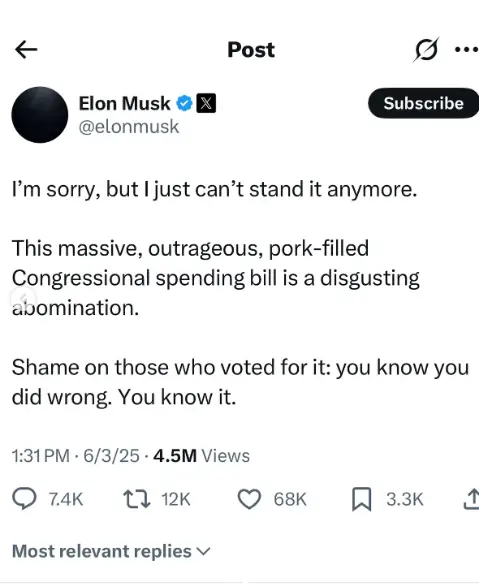image/ getty
It wasn’t long ago that Elon Musk seemed like a key figure orbiting the Trump administration, a tech titan occasionally advising the President. But whispers have turned into sourced reports, suggesting a significant and widening rift between the billionaire provocateur and the White House. Beyond the public spats played out on social media, multiple points of friction are emerging, painting a picture of an alliance under serious strain.
While Musk’s public criticism of President Trump’s signature spending bill grabbed headlines, sources close to both men reveal deeper disagreements bubbling beneath the surface. From threatened electric vehicle tax credits and controversial AI deals to a scuttled NASA nomination and clashes over trade policy, the list of grievances appears to be growing. Is this just business as usual in the high-stakes world of politics and tech, or are we witnessing the breakdown of a once-promising, if always volatile, relationship?
Let’s dissect the reported points of contention, explore the potential motivations, and analyze what this growing divide means for Musk, Trump, and the future of tech policy in America.
The Spending Bill Spat: Public Outcry, Private Pains
The most visible crack appeared recently with Musk’s vocal opposition to the administration’s major funding bill.
Musk’s Public Rebuke: “Disgusting Abomination”

Never one to mince words, Musk took to his platform, X, to lambaste the spending package designed to advance President Trump’s legislative agenda. Calling the bill a “disgusting abomination” and warning it “will massively increase the already gigantic budget deficit,” Musk made his displeasure public knowledge. This direct attack on a key piece of Trump’s policy was a significant departure from previous, more measured interactions.
The EV Tax Credit Threat
However, sources suggest Musk’s objections run deeper than just the overall spending levels. According to multiple people who have spoken with the billionaire, as reported by Musk is privately frustrated about a specific provision within the bill that threatens to cut the electric vehicle (EV) tax credit.
This marks a notable shift. After the November election, Musk himself had called for ending such credits. Yet, more recently, his company, Tesla, has become a vocal opponent of removing the provision prematurely. “Abruptly ending the energy tax credits would threaten America’s energy independence and the reliability of our grid,” Tesla stated in a social media post. This clash highlights a direct conflict between the administration’s legislative push and the interests of Musk’s flagship company.
Beyond the Budget: Deeper Cracks Emerge
The disagreements reportedly extend far beyond fiscal policy, touching upon Musk’s other ventures and alliances.
AI Deals and Competitive Friction
Another significant point of contention, according to sources cited by [ABC News](Elon Musk privately expresses frustration on a range of recent moves by Trump administration: Sources), involves the burgeoning field of artificial intelligence. Musk has apparently grown increasingly frustrated with the Trump administration striking AI deals with his competitor, OpenAI.
Behind the scenes, the billionaire reportedly raised objections about agreements that did not include his own AI start-up company (presumably xAI). Despite his protests, these deals ultimately moved forward, potentially leaving Musk feeling sidelined in a critical technological race and highlighting a competitive friction point with the administration’s strategic partnerships.
NASA Nomination Snub: Isaacman’s Withdrawal

Jared Isaacman / Getty / image
The administration’s handling of personnel appointments has also allegedly caused friction. Over the weekend prior to the reports, the nomination of Jared Isaacman as NASA administrator was withdrawn. Isaacman, a billionaire entrepreneur known for commanding the private SpaceX Inspiration4 mission, is considered an ally of Musk.
Sources indicate that Musk was deeply disappointed by this move. The withdrawal removes a potentially sympathetic figure from a key position overseeing an agency crucial to Musk’s SpaceX ambitions, adding another layer to the perceived administrative snubs.
Clashing on Trade: The Navarro Feud
Deep disagreements on trade policy have also spilled into public view, predating the recent spending bill controversy. Back in April, Musk launched a scathing attack on Trump’s trade advisor, Peter Navarro, in a series of posts on X.
Calling Navarro a “moron” and “dumber than a sack of bricks”, Musk made his disdain clear. While seemingly a personal attack, it likely stemmed from fundamental disagreements on trade strategies, tariffs, and their impact on global supply chains vital to companies like Tesla. This earlier clash underscores a longer-standing tension over economic policy between the tech mogul and key administration figures.
Analyzing the Rift: Ideology vs. Interests?
Understanding the root causes of this widening rift requires looking beyond individual incidents. Is this a clash of personalities, a divergence of ideologies, or simply the inevitable friction when powerful business interests collide with political agendas?
Shifting Alignments: A Complex Dance
Musk’s relationship with the political sphere has always been complex and seemingly transactional. He has engaged with administrations of both parties, often aligning with policies that benefit his diverse portfolio of companies – from SpaceX’s government contracts to Tesla’s reliance on environmental regulations and credits. His initial engagement with the Trump administration might have been seen as pragmatic, seeking influence and favorable conditions.
However, Musk’s own outspoken, often libertarian-leaning and anti-establishment views don’t always neatly align with traditional party platforms. The current friction could represent a point where the administration’s specific actions (like the potential EV credit cut or AI partner choices) directly conflict with Musk’s strategic goals, outweighing any previous perceived alignment or ideological common ground.
Business Imperatives vs. Political Winds
It’s difficult to disentangle Musk the ideologue from Musk the businessman. Each point of reported friction directly impacts one of his major ventures:
- EV Credits: Directly affect Tesla’s bottom line and market competitiveness.
- AI Deals: Influence the trajectory and potential success of xAI against rivals like OpenAI.
- NASA Nomination: Impacts the leadership and potentially the direction of a key partner/customer for SpaceX.
- Trade Policy: Affects global supply chains, manufacturing costs, and market access for Tesla and potentially other ventures.
While Musk often frames his arguments in broader terms (deficit spending, free markets, technological progress), the specific nature of the reported private frustrations strongly suggests that threats to his business interests are a primary driver of the conflict. The public pronouncements may serve as leverage or expressions of genuine belief, but the underlying clashes appear deeply rooted in the practical realities of running his multi-billion dollar enterprises within the current political landscape.
Conclusion: An Uneasy Alliance Crumbles?
The reports of growing friction between Elon Musk and the Trump administration paint a picture far more complex than simple political alignment or opposition. What may have once appeared as a pragmatic, if sometimes awkward, relationship between a disruptive tech leader and a populist president now seems fraught with specific, tangible disagreements impacting Musk’s core business interests.
From the public denouncement of the administration’s key spending bill, fueled by private frustrations over EV tax credits, to behind-the-scenes battles over lucrative AI contracts and disappointment regarding the NASA leadership nomination, the points of conflict are stacking up. Add to this the pre-existing tensions over trade policy, exemplified by the public spat with Peter Navarro, and a pattern emerges: when administration policies or decisions directly impede or disadvantage Musk’s ventures, the tech mogul is increasingly willing to push back, both privately and publicly.
While ideological leanings and personal relationships might play a role, the evidence strongly suggests that the widening rift is primarily driven by the collision of Musk’s vast and varied business empire with the specific policy choices and strategic directions of the administration. It serves as a stark reminder that in the world of high-stakes politics and global business, alliances can be fluid and self-interest often dictates the terms of engagement.
Whether this friction signals a permanent break or just another turbulent chapter in Musk’s notoriously unpredictable relationship with power remains to be seen. However, it undeniably highlights the challenges and complexities faced when integrating disruptive technology and its powerful proponents into the established political framework. The future trajectory of this uneasy alliance will undoubtedly continue to be closely watched, offering insights into the evolving interplay between Silicon Valley and Washington.
Maybe you also like:
Follow me on:
For more updates, visit: flashpointnews.com.br


